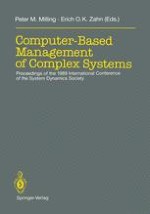1989 | OriginalPaper | Buchkapitel
Learning in dynamic simulation games; using performance as a measure
verfasst von : Bent E. Bakken
Erschienen in: Computer-Based Management of Complex Systems
Verlag: Springer Berlin Heidelberg
Enthalten in: Professional Book Archive
Aktivieren Sie unsere intelligente Suche, um passende Fachinhalte oder Patente zu finden.
Wählen Sie Textabschnitte aus um mit Künstlicher Intelligenz passenden Patente zu finden. powered by
Markieren Sie Textabschnitte, um KI-gestützt weitere passende Inhalte zu finden. powered by
In a dynamic simulation game portraying a multiplier-accelerator investment problem, there are major differences between high and low performers; high performers voice specific concerns for future states of the system, while low performers are less likely to think about the future. Planning, especially incorporating the deceptive nature of feedback, is necessary in systems that exhibit diverging long and short term behaviors. A comparison of game results with written reports shows that there is a positive relationship between performance and understanding of the game. These results are contrary to previous research where performance and understanding have been unrelated (Broadbent et al. 1978, 1986), but can be explained by the added complexity of non-linear feedback tasks with shifts in loop dominance. Such tasks are, in contrast to simple regression model tasks, non-routine and therefore verbal and behavior aspects of decision makers’ mental models correspond.
